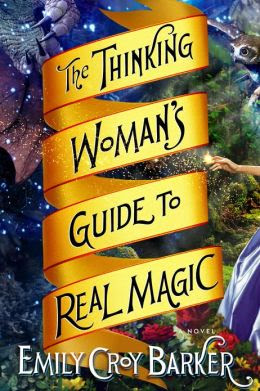The winner is.....Jessica Longwisch!
Jessica, email me at supersue66@gmaildotcom
with your address and I will send it to the publisher!
Congratulations and thanks to Viking/Penguin for the contest. Here's a conversation with Emily Croy Barker about her book:
Emily Croy Barker, author of
THE THINKING WOMAN’S GUIDE TO REAL MAGIC
Pamela Dorman Books/Viking; on-sale August 5, 2013; 9780670023660; $27.95
Q. Which of the characters in THE THINKING WOMAN’S GUIDE TO REAL MAGIC did you most enjoy writing?
A. Aruendiel, no question. He says exactly what he thinks, and he doesn’t mind giving offense to anyone. Not something that most of us can get away with in our daily lives.
Of course, Ilissa was also a lot of fun, too. Because she’s also honest—Faitoren can’t tell lies—but at the same time, she’s thoroughly deceitful.
Q. Are any parts of this novel autobiographical?
A. You mean, is it about the time I stumbled into an alternate world and started studying magic? Sadly, no.
There were things in my life that I deliberately borrowed for the novel. The way Aruendiel talks about other magicians—I was thinking of how my father, who was a painter, used to talk with his artist friends about other artists, about who was doing good work and who wasn’t. My dad was the kindest and most gentle person ever, but he was ruthless when it came to criticizing bad art. It’s the idea that you have a calling that you have to follow and you don’t sell out.
I gave Nora some of my interests—a penchant for memorizing bits of poetry, a love of cooking—although she’s much better at both things than I am. She’s also braver than me. You could never get me to go up a cliff like the one at Maarikok, even with a levitation spell! And I let her take a path that I considered but never took—going to grad school in English.
Q. Your heroine, Nora Fischer, is swept away by magic into a kind of too good to be true existence. Even though a part of her knew it wasn’t right she stayed. Why would she allow herself to be easily enchanted?
A. As Aruendiel himself would point out, Faitoren enchantments are very hard to fight, because they give you something you want. Nora was feeling bruised and defeated, and suddenly she had everything that she thought she was missing.
I also think the kind of idealized femininity that Ilissa offers Nora—being beautiful, being the belle of the ball, having this perfect romantic love—is a very seductive thing, even for someone like Nora who has read all the feminist theorists and has really chosen the life of the mind. Maybe especially for someone like Nora.
Q. You have so many literary references, John Donne, Miguel de Cervantes, William Carlos Williams, Alice in Wonderland and Grimm’s Fairytales, but it’s Jane Austen’s Pride & Prejudice that Nora ends up with as her only possession in the alternate world. What is the significance of this particular book? Any personal connection to it?
A. Well, Pride and Prejudice is so modern in many ways, although written and set in a premodern time. So it seemed like a good match for A Thinking Woman’s Guide, where a contemporary woman is thrown into a world where women are still second-class citizens, at best. And Pride and Prejudice reflects some of the themes that I was interested in—an intelligent woman engaging with a man who has both higher status and worse manners than she does—without being too closely parallel to the plot of my story. Finally, I love Pride and Prejudice! And so do many other readers. So I hoped it might resonate with those who read my novel.
Q. Words are a powerful tool and language is a very important status symbol in Nora’s new world. Women are uneducated and don’t speak to men the same way Nora does; something she is repeatedly frustrated by. How did you develop Ors, the language Nora must learn in order to communicate?
A. Language reflects society, so as I thought about Aruendiel’s world, I tried to imagine what sort of linguistic rules it would have to help keep women in their place. And as anyone who has studied a foreign language knows, there are all kinds of subtleties that you don’t pick up right away. You can make blooper after blooper, sometimes for years. So Nora keeps bumping up against things like the feminine verb endings, which she never noticed until Aruendiel rather officiously points them out to her.
I was also inspired by how Tolkien, who was a philologist, essentially began imagining Middle-Earth by inventing various Elvish names. He wrote poems about these characters and, eventually, fiction. I thought, wow, what a powerful tool to create a believable fantasy universe, to develop some kind of logical linguistic framework that underlies your story.
Q. You’re a journalist by trade. What was it like, switching to fiction? Where do you write? Do you set hours or just put pen to paper when inspiration strikes?
A. It took me a while to feel comfortable writing fiction. It’s a different kind of narration. Suddenly, after years of having to be super-careful about collecting facts and double-checking them, I could make everything up. That felt wonderful! But what exactly do you include, what do you leave out? Beginning writers are always told, “Show, don’t tell.” Well, in fact there’s a lot you have to simply tell, or you’ll write twenty pages and your character will still be finishing breakfast.
The journalistic skill that I found most useful in writing fiction was simply the ability to sit in front of the computer and write. Even if you’re just trying to write, even if what you’re writing isn’t great at the moment or if all you have to show after three hours is three sentences. And then to do it again the next day. It doesn’t matter if you have to rewrite it all over again—because you’ll find something that’s worth keeping, or you’ll learn what not to do. The important thing is to keep going.
Usually I write at home on my laptop—sometimes on the train when I travel. I write best during the day. If I try to write at night, I’m usually too tired to get very far. Or occasionally I’ve had the opposite problem—I get really into it and then suddenly it’s way past my bedtime and I’m useless the next day. So starting out, I wrote for a couple of hours every weekend. Then it became every spare moment of every weekend. I still owe huge apologies to so many of my friends for turning down all their lovely invitations to go to museums, parties, movies, et cetera, over the past seven years.
Q. Who would be in your dream book club? Where would you meet and what would you talk about?
A. Henry James, Charlotte Brontë, Scott Fitzgerald, Mary McCarthy, Zadie Smith, and couple of my friends. We’d meet at Florian’s in the Piazza San Marco every third Tuesday in the month—this is a dream, right?—and talk about whatever I happen to be reading at the moment. I imagine it would be a lively group.
Q. Are you a fan of other fantasy novels?
A. Yes, although I certainly haven’t read everything that’s out there. I tend to like the denser, more literary kind of fantasy. Unlike Nora, I love Tolkien. Also Neil Gaiman, Susanna Clarke, Alice Hoffman, Margaret Atwood, Ursula LeGuin, and Kelly Link. Kate Atkinson is best known now for her Jackson Brodie mysteries, but I’m really glad that I didn’t read her Human Croquet until after I wrote The Thinking Woman’s Guide, because in some ways that’s the book I wanted to write.
Q. Your writing is loaded with references from history, literature, and fantasy. What sort of reader did you envision for this series?
A. I tried to write the kind of novel I would want to read, so I guess in that sense I wrote it for myself. And as the book took shape and it became clearer that I would actually finish a draft at some point, I decided I would send it first to one of my oldest friends to see if she thought it was any good. She and I grew up watching Star Trek and Monty Python, reading Sherlock Holmes and The Black Stallion and Jane Eyre, and doing the ultimate in geekdom—taking Latin—so I trusted her judgment. She liked it, so that encouraged me to keep revising.
Beyond that, I was thinking that it might appeal to some of the adults who loved Harry Potter but who wanted more of a adult perspective and a strong female character at the center of the novel.
Q. The Thinking Woman’s Guide To Real Magic ends on a cliffhanger. Can you hint at what’s next for Nora and Aruendiel?
A. I’m pretty sure that Nora will find her way back to Aruendiel’s world. The two of them really need to talk and to be straight with each other, don’t you agree? And of course she has a lot more to learn about magic—and how to use it properly.
For more information please contact:
Meredith Burks, Meredith.Burks@us.penguingroup.com, 212-366-2275



No comments :
Post a Comment